SPECIAL REPORT : Part 425
Mismanagement of cash cow SLPA, where still it’s carry on as usual
By Shamindra Ferdinando
The United States is keen to further enhance and consolidate its role in Sri Lanka. The current turmoil that has been caused by waste, corruption, irregularities, mismanagement of the economy over the years as well as a spate of ill-advised decisions taken by the incumbent administration would facilitate the US strategy here. The global fuel and food crises caused by Russia rushing into a quagmire in Ukraine, essentially tailor made by the West, as happened to its predecessor the Soviet Union in Afghanistan earlier, has further debilitated the Sri Lankan and many other economies.
The failure on the part of the ruling SLPP and the Opposition to reach a consensus regarding a common action plan to face the daunting economic challenges, has assisted the U.S. and common ‘Quad’ approach towards Sri Lanka. The organization consists of the U.S. Japan, Australia and India, the last now more or less a reluctant bride.
The U.S. wants to strengthen Sri Lanka’s accounting and auditing sectors as part of its overall measures to improve the public sector here. Other ‘Quad’ members are pursuing combined as well as individual strategies pertaining to Sri Lanka. India is now in a position to dominate Sri Lanka in every aspect. The push to expand network of Lanka IOC service station is a case in point.
Speculation is rife of New Delhi seeking to further enhance its share of the oil market here in a situation of utter economic turmoil caused by unprecedented shortages.
The recent announcement that the USAID (U.S. Agency for International Development) would partner the Institute of Chartered Accountants of Sri Lanka (CA Sri Lanka) and the Association of Public Finance Accountants of Sri Lanka (APFASL) to toughen Sri Lanka’s accounting and auditing sectors was amidst the worst ever economic turmoil. The US project, according to a statement issued by the U.S. Embassy in Colombo, is meant to train approximately 600 public sector accountants and audit professionals and 1,200 officers on IT applications and other platforms that support strategic decision-making.
U.S. Ambassador Julie Chung declared at the launch of the project the partnership with CA Sri Lanka and APFASL would contribute towards greater accountability in the public sector. The Embassy, in a statement issued on June 15, 2022, quoted Chung as having said that as one of Sri Lanka’s longstanding development partners, the U.S vision was to help the country to emerge from crises stronger than before.
The statement also quoted Sanjaya Bandara, President of CA Sri Lanka, as having said that “Strong public financial management is very critical for Sri Lanka to achieve its long-term goals. President of APFASL V. Kanagasabapathy profusely thanked the USAID for the recognition of its efforts. The U.S. Embassy quoted Kanagasabapathy as having said that APFASL’ vision was to lead the public financial management to excellence while helping the sector to continue to play a pioneering role in Sri Lanka.
The countrywide U.S. project, according to the statement, is meant to provide a framework for the preparation and presentation of financial statements in compliance with international best practices for quality financial accounting and reporting. Having published the US statement, the writer asked the Embassy whether it would be possible to know the total cost and duration of the project and who would receive the funding?
The Island received the following response: “This initiative is a series of trainings supported by the United States. The training will be attended by public sector accountants and audit professionals to strengthen oversight and accountability capacity in Sri Lanka.”
The Island again asked the U.S. Embassy whether it would be possible to know the total cost of the project. We received the following second response: “This initiative includes 24 training programmes over the course of two years. Training programmes will take place in all 9 Sri Lankan provinces.”
After having thanked the U.S. Embassy, The Island once again repeated the question how much the project would cost the US? The Embassy didn’t respond to that query. That was nearly two weeks ago.
Question mark over 2016 US project
The latest project can be examined taking into consideration the high profile USAID funded three-year project launched in late Nov. 2016. Budgeted at USD 13,000 mn (Rs 1.92 bn), the project launch that took place in Parliament under the auspices of the then Speaker Karu Jayasuriya and USAID Mission Director Andrew Sisson, the gathering was told the Strengthening Democratic Governance and Accountability Project (SDGAP) would improve strategic planning and communication within government and Parliament, enhance public outreach, develop more effective policy reform and implementation processes, and increase political participation of women and underrepresented groups in Parliament and at local levels.
Had that project achieved stated goals, Sri Lanka wouldn’t be in the current predicament. It would be pertinent to mention that the U.S. finalized the project over eight months after the then Central Bank Governor Singaporean national Arjuna Mahendran perpetrated the second far bigger Treasury bond scam. So were all those American efforts nothing more than a smokescreen for other agendas?
The CBSL perpetrated the first scam in February 2015, just few weeks after the US-backed campaign installed Maithripala Sirisena as the President, which they shamelessly crowed about publicly with none other than then Secretary of State John Kerry announcing it to the world. Mahendran carried out the second bond scam in late March 2016, half a year after the UNP won the general election.
The release of the unedited video footage of the examination of public enterprises undertaken by the parliamentary watchdog, the Committee on Public Enterprises (COPE) under the leadership of Prof. Charitha Herath MP has exposed unbridled waste, corruption, irregularities and mismanagement of state enterprises. Unfortunately, the media and the civil society hadn’t taken advantage of the availability of such video footage released by the Parliament to educate the public. The press releases issued by the Parliament on proceedings at the COPE, COPA (Committee on Public Accounts) and COPF (Committee of Public Finance) quite clearly helped the media, but video footage provided much clearer picture of the developments taking place.
The video footage of the Sri Lanka Ports Authority (SLPA) top management appearing before the COPE on June 22, 2022 is a case in point. The proceedings revealed not only a pathetic state in public sector finance but the failure on the part of the executive, legislature and the judiciary to address these issues at hand. Prof. Charitha Herath flanked by Auditor General W.P.C. Wickramaratne and Secretary to the COPE Nishanthi Wickramasinghe examined the top SLPA management. Ports and Shipping Secretary K.D.S. Ruwanchandra, flanked by Chairman, SLPA Dr. Prasantha Jayamanna, Director J.R.U. de Silva and Chief Financial Officer, Ports and Shipping Ministry Sandhya Pushparani. They were on the first row. Isuru Balpatabendi, Director sat in between Chairman, Jaya Container Terminal Attorney-at-Law Lakmal Ratnayake, and its Managing Director Upul Jayatissa. Director General Customs Maj. Gen. (ret.) G.V. Ravipriya also sat on the second row as a Director of the cash cow.
The COPE didn’t raise any queries from Isuru Balpatabendi nor did he offer any explanations. Balapatabendi’s presence among the eight-member Board of Directors should be examined taking into consideration of him being the Secretary of the Bar Association of Sri Lanka (BASL). Having offered solutions to overcome the current political, economic and social crisis, the BASL cannot turn a blind eye to continuing waste, corruption, irregularities and mismanagement in the public sector. The SLPA can be a case study for the BASL.
The bottom line is that Sri Lanka is currently in such a desperate situation the US may find the environment conducive for a fresh attempt to force SOFA (Status of Forces Agreement) and MCC (Millennium Challenge Corporation) on Sri Lanka. The US succeeded in securing Sri Lanka’s consent for ACSA (Access and Cross Servicing Agreement) in Aug 2017. Interestingly both Ranil Wickremesinghe and Maithripala Sirisena who approved ACSA that gave US military access to Sri Lanka are now with President Gotabaya Rajapaksa’s government.
Importance of internal audit
At the onset of the COPE proceedings, Prof. Herath sought an explanation as regards the status of the internal audit. Obviously, Chief Internal Auditor, SLPA, Gayani Liyanage responses as well as that of the SLPA Chairman to specific questions didn’t appease Prof. Herath, who asserted that poor internal audit could be one of the reasons for the current issues. Prof. Herath asked the SLPA Chairman not to assign tasks to the 53-strong internal audit unit outside their legitimate duties.
Herath raised several contentious issues with COPE members Patali Champika Ranawaka (PCR), Madura Vithanage, Jagath Pushpakumara, D.V. Chanaka, Eran Wickramaratne and Premanath C. Dolawatta making valuable contributions. PCR was particularly spot on. The former JHU heavyweight dealt firmly and expertly with contentious issues while Vithanage targeted the Finance.
The following are the main points of contention:
(1) The loan obtained from China to build Hambantota port has been removed from all government financial statements. As at Dec 31, 2021, Sri Lanka owed China Rs 165.4 bn (USD 1.89 bn). USD 1.2 bn received from China for 99-year lease of the strategic port hadn’t been utilized to settle the loan. Instead, the USD 1.2 bn had been spent though the COPE was not told of the allocation of USD 1.2 bn. The Treasury now services the loan. Prof. Herath requested Ports and Shipping Ministry Secretary Ruwanchandra to submit a comprehensive report on this matter.
(2) The COPE sought an explanation from the SLPA why the state enterprise failed to market the Hambantota port the way the Chinese did after the finalization of the USD 1.2 bn agreement on the 99-year-lease on the commercially strategic port.
(3) Massive losses suffered as a result of procurement of a stock of oil at a cost of USD 24.3 mn (Rs 8,000 mn) that had to be sold for USD 3.5. COPE questioned Niroshan Siriwardena, Managing Director, Magampura port over the circumstances the outfit unwisely utilized the loan obtained from a bank on the advice of a consultant. COPE recommended the SLPA and the Secretary Ports and Shipping Ministry to take legal measures against the consultant. Proceedings revealed Magampura port operation is nothing but an absolute waste of public funds. The failure on the part of those responsible to take tangible action in this regard stressed.
(4) The inordinate and continuing delay in equipping the ECT (East Container Terminal) thereby giving advantage to the China owned CICT (Colombo International Container Terminal) and SAGT (South Asia Gateway Terminal). The SLPA owned 15 percent each of both CICT and SAGT. The negligence and the failures on the part of those responsible for transformation of the ECT seemed, in a way, deliberate. The parliamentary watchdog questioned the possibility of some interested party purposely undermining the operation. The fault seemed to be at the level of Cabinet of Ministers as well as successive SLPA administrations. The issue of taking delivery of gantry cranes before constructing specific positions they were to be installed shocking and disappointing. The COPE took notice of the fact that such equipment took one and half years to be built after an order was placed. It transpired that the cost of the civil works component was USD 198 mn (65% local currency) and equipment installation cost USD 282 mn. However, the installation has been delayed due to the failure on the part of the SLPA’s state bank to provide the required financing. The shocking revelation that the ECT hadn’t been expanded for five years after the completion of the 400 m stretch is evidence that successive governments failed public expectations. Lawmaker PCR emphasized the pivotal importance of revisiting the ECT project as the ground situation has changed. The MP reminded the SLPA and the COPE of the government’s admission of bankruptcy.
(5) Dispute over the SLPA’s stated profits. The SLPA challenged the Auditor General’s estimate that the state enterprise earned Rs 45 bn in 2021. The SLPA placed annual profits at Rs 62 bn. The COPE also made reference to the SAGT returning to the SLPA in 2019 and the government’s responsibility in that regard.
(6) The loss of revenue as well as foreign shippers’ faith in the SLPA as a result of the strike launched on June 10, 2020.
(7) Construction of Adani Group-led CWIT (Colombo West International Terminal). Comparison of the CICT and the SAGT workforce with that of the SLPA and the sharp difference in the number of the private sector workers and the SLPA. The SLPA seemed a law unto itself with the disclosure that the highly profitable venture operated to a certain extent outside the purview of the Management Services Department though the total number of employees remained well under the stipulated figure 9,900. The COPE stressed the need to ensure that the SLPA under any circumstances didn’t go beyond the stipulated number of workers. The current work force comprised 9,300.
(8) Rohitha Abeygunawardena who served as the Ports and Shipping Minister of President Gotabaya Rajapaksa till April 2020 raised the contentious issue of recruitment beyond the approved cadre. The lawmaker stressed the need to compare the private sector operations and that of the SLPA. The COPE was told that though the total approved cadre hadn’t been exceeded, recruitment has been carried out in an irregular and extremely shoddy manner.
(9) Big question mark over the transfer of just Rs. 600 mn out of 69,686 mn profits (2016-2021) period and the pathetic failure on the part of the Finance Ministry to address the issue.
(10) Absence of a cohesive and efficient system to charge CICT and SAGT for certain services rendered by the SLPA.
(11) Growing overtime Bill with 2021 recording a staggering Rs 5.8 bn in extra payments. Scandalous disclosure some workers earned overtime for 400 hours and unskilled work assistants numbering 1,500 continued to be a heavy burden.
(12) Controversy over so-called collective agreement that ensured salary increase every three years. The COPE stressed the need to have guidelines formulated by the Management Services Department to prevent exploitation of collective agreements as the process threatened financial stability.
The SLPA, in spite of being a profit making state enterprise, remains in an utterly chaotic situation. The SLPA hasn’t been a burden on the taxpayer though the national carrier SriLankan, the CEB and the CPC bled the country dry. But casual examination indicates regardless of the financial status a section of public servants continued to enjoy perks and privileges while the entire country suffered as a result of local and some external factors beyond Sri Lanka’s control.

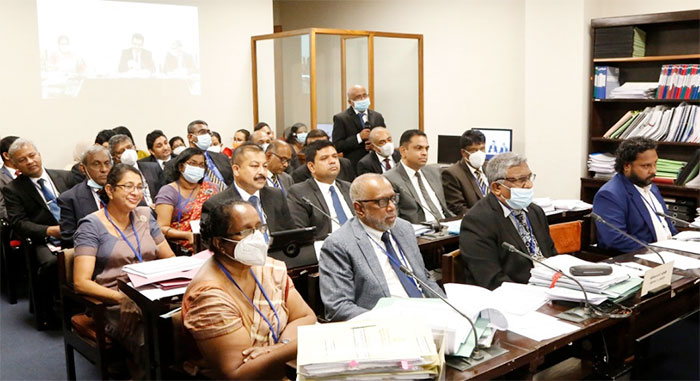
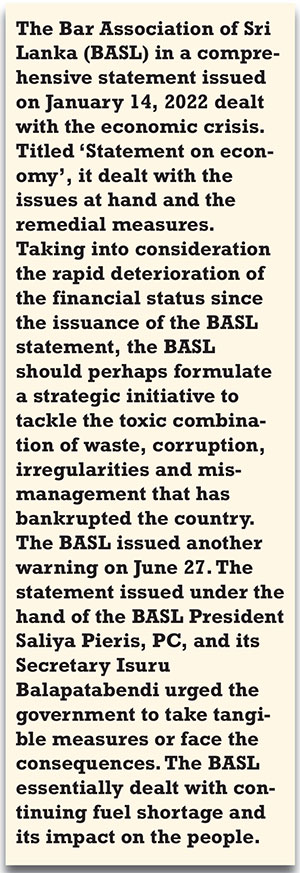 The latest project can be examined taking into consideration the high profile USAID funded three-year project launched in late Nov. 2016. Budgeted at USD 13,000 mn (Rs 1.92 bn), the project launch that took place in Parliament under the auspices of the then Speaker Karu Jayasuriya and USAID Mission Director Andrew Sisson, the gathering was told the Strengthening Democratic Governance and Accountability Project (SDGAP) would improve strategic planning and communication within government and Parliament, enhance public outreach, develop more effective policy reform and implementation processes, and increase political participation of women and underrepresented groups in Parliament and at local levels.
The latest project can be examined taking into consideration the high profile USAID funded three-year project launched in late Nov. 2016. Budgeted at USD 13,000 mn (Rs 1.92 bn), the project launch that took place in Parliament under the auspices of the then Speaker Karu Jayasuriya and USAID Mission Director Andrew Sisson, the gathering was told the Strengthening Democratic Governance and Accountability Project (SDGAP) would improve strategic planning and communication within government and Parliament, enhance public outreach, develop more effective policy reform and implementation processes, and increase political participation of women and underrepresented groups in Parliament and at local levels. The following are the main points of contention:
The following are the main points of contention: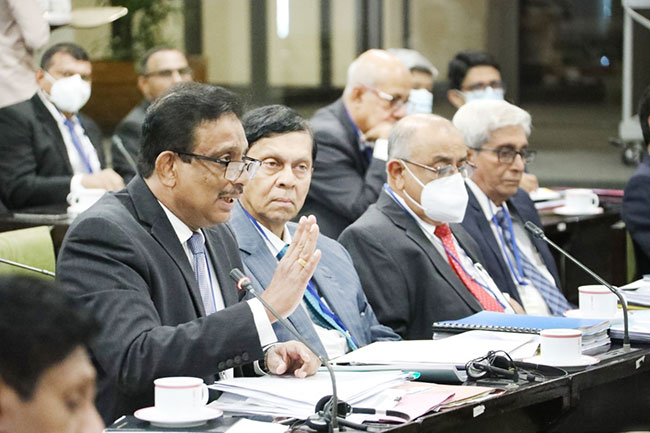
 The term of office of an appointed member of the Monetary Board is six years and in the event of vacation of office by the appointed member, another person shall be appointed in his or her place to hold the office during the unexpired part of the term of office.
The term of office of an appointed member of the Monetary Board is six years and in the event of vacation of office by the appointed member, another person shall be appointed in his or her place to hold the office during the unexpired part of the term of office.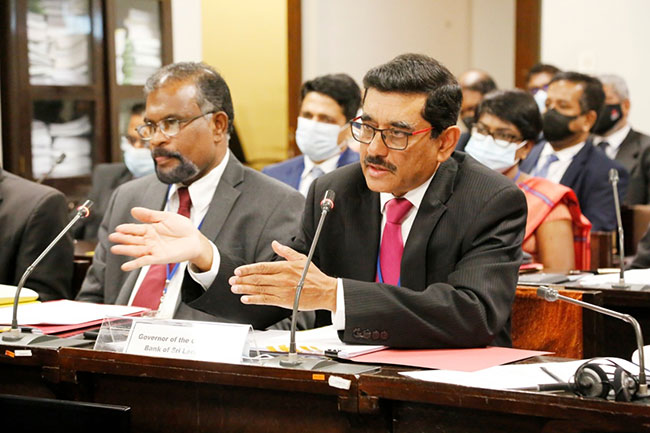 CBSL Governor Dr. Nandalal Weerasinghe before COPE on May 25, 2022. Finance Secretary Mahinda Siriwardana is on Dr. Weerasinghe’s right.
CBSL Governor Dr. Nandalal Weerasinghe before COPE on May 25, 2022. Finance Secretary Mahinda Siriwardana is on Dr. Weerasinghe’s right.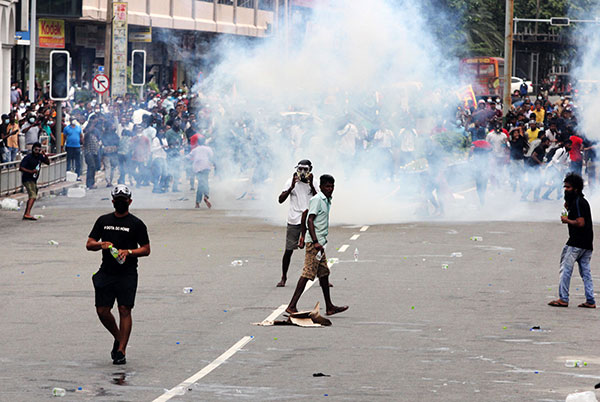
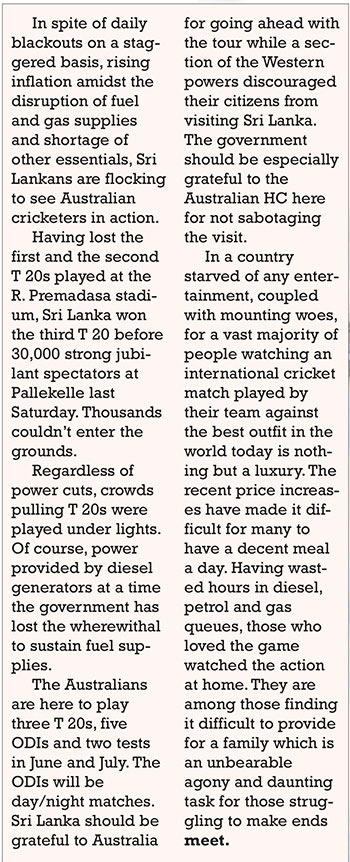 The Institute of National Security Studies (INSS) recently dealt with the relevance of political stability for national security. Dr. Prathibha Mahanamahewa, and Director/CEO Hector Kobbekaduwa Agrarian Training Institute Malinda Seneviratne, a former colleague of ours at The Island editorial, addressed the issues at hand. Acting Director General of the INSS Rear Admiral Dimuthu Gunawardene, who is also the Director of Communications and Publications of the outfit, moderated the event.
The Institute of National Security Studies (INSS) recently dealt with the relevance of political stability for national security. Dr. Prathibha Mahanamahewa, and Director/CEO Hector Kobbekaduwa Agrarian Training Institute Malinda Seneviratne, a former colleague of ours at The Island editorial, addressed the issues at hand. Acting Director General of the INSS Rear Admiral Dimuthu Gunawardene, who is also the Director of Communications and Publications of the outfit, moderated the event.